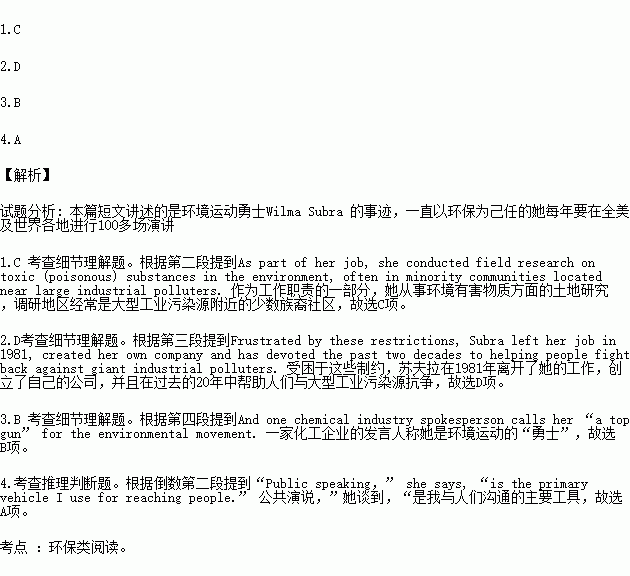题目内容
Wilma Subra had no intention of becoming a public speaker. After graduating from college with degrees in chemistry and microbiology, she went to work at Gulf South Research Institute in Louisiana.
As part of her job, she conducted field research on toxic (poisonous) substances in the environment, often in minority communities located near large industrial polluters. She found many families were being exposed to high, sometimes deadly levels of chemicals and other toxic substances. But she was not allowed to make her information public.
Frustrated by these restrictions, Subra left her job in 1981, created her own company and has devoted the past two decades to helping people fight back against giant industrial polluters. She works with families and community groups to conduct environmental tests, interpret test results, and organize for change.
Because of her efforts, dozens of toxic sites across the country have been cleaned up. And one chemical industry spokesperson calls her “a_top_gun” for the environmental movement.
How has Subra achieved all this? Partly through her scientific training.Partly through her commitment to environmental justice. But just as important is her ability to communicate with people through public speaking. “Public speaking,” she says, “is the primary vehicle I use for reaching people.”
If you had asked Subra before 1981 “Do you see yourself as a major public speaker?”, she would have laughed at the idea. Yet today she gives more than one hundred presentations a year. Along the way, she’s lectured at Harvard, testified before Congress, and addressed audiences in 40 states, as well as in Mexico, Canada, and Japan.
1.What did Wilma Subra study for her job before 1981?
A. Chemistry and microbiology.
B. Families affected by toxic chemicals.
C. Toxic substances in the environment.
D. Minority communities near industrial polluters.
2.Why did Wilma Subra quit her job in 1981?
A. She wanted to create her own company.
B. She preferred freedom to restrictions.
C. She hoped to work with families and communities.
D. She was forbidden to inform the public of toxic pollution.
3.Wilma Subra is called “a top gun” in the 4th paragraph for ________.
A. her scientific training
B. her efforts to fight against pollution
C. her help in closing down dozens of toxic sites
D. her strong belief in environmental justice
4.What does Wilma Subra think of “public speaking”?
A. She values it. B. She laughs at it.
C. She is against it. D. She has no idea of it.
 名校课堂系列答案
名校课堂系列答案
